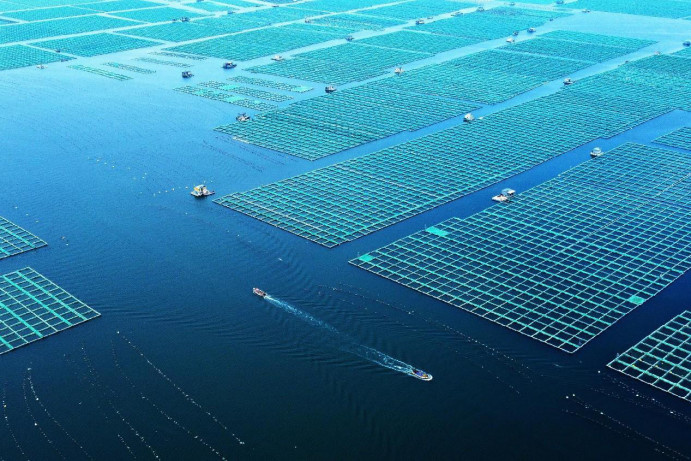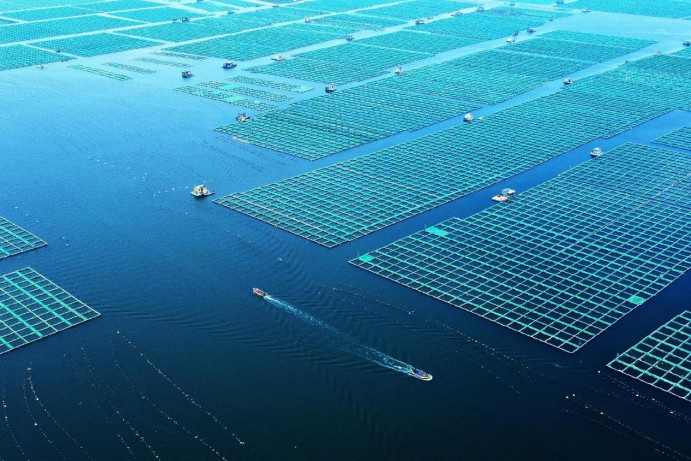By Yang Junfeng, Xu Yujie

Photo shows a marine ranch in Rongcheng, east China's Shandong province. (Photo by Wang Fudong/People's Daily Online)
China is vigorously exploring the "blue ocean" with years of efforts in building marine ranches with innovative technologies.
"Each piece of kelp in this row weighs a lot and is taller than an adult. We are busy all year round after starting kelp farming, and our income today is several times higher than before," said Liu Zuhua from Quangang district, Quanzhou, southeast China's Fujian province, holding the kelp he cultivated.
The sea waters in the district are a "marine farmland" for local fishermen. The kelp business there has emerged as one of the pillar industries, and the income of fishermen has increased year by year.
According to the man, more than a dozen years ago, he made a living by fishing at sea before starting kelp farming. He had to stay at home and had no source of income during fishing moratoriums.
"Things are different today. I can do kelp farming during the moratoriums, which expands my income and leads me to a better life," he told People's Daily.
Liu has contracted 100 mu (6.67 hectares) of kelp farming areas this year, and the income of his family has jumped to over 300,000 yuan ($42,195) from less than 100,000 yuan in the past.
A marine ranch is a facility built by placing artificial fish reefs and other measures in a specific sea area, where marine life propagate, grow, forage or take shelter. It is a fishery model that aims at the sustainable utilization of fishery resources.
Compared with traditional marine farming, marine ranches pay more attention to the application of science and technologies in production, as well as targeted management. While contributing to the restoration of marine ecology, marine ranches help promote the transformation of the fishery sector from a quantity-oriented industry to one that prioritizes quality and efficiency.
Over recent years, China has made steady progress in the construction of marine ranches. It issued its first national standard on building marine ranches, and incorporated optimizing the layout of offshore green aquaculture, building marine ranches and developing sustainable distant-water fishery into its Outline of the 14th Five-Year Plan (2021-2025) for National Economic and Social Development and the Long-Range Objectives Through the Year 2035.
So far, the country is home to more than 300 marine ranches and has released over 50 million cubic meters of artificial reefs. The strategy of "blue granary" is taking shape in the vast sea areas of China.
Marine ranches boast high economic, ecological and social benefits. They not only protect the environment, but also expand income and production for fishermen.
Aquaculture is getting more and more science-based and intelligent today as relevant technologies and equipment are becoming smart, standardized and applied on a large scale.
Genghai No.1 is a marine ranching complex in Laishan district, Yantai, east China's Shandong province, which looks like a gemstone necklace on the blue ocean.
On one end of the "necklace" there is a flower-shaped intelligent fish farm, and on the other end stands a multi-functional space in the shape of a starfish.
The complex comes with a batch of tech-ish equipment. For instance, its electricity is provided by solar and wind power generation systems, and a sewage disposal system can send disposed waste to terminals designated by environmental authorities for centralized treatment.
Besides, there's also a seawater desalination device able to produce 20 cubic meters of fresh water on a daily basis, which is equivalent to three days of fresh water consumption on the complex.
The intelligent fish farm on the complex has three aquaculture cages, each with a diameter of 40 meters and a maximum breeding volume of about 10,000 cubic meters. It's a great fishing ground for visitors.
"These cages can produce 200,000 high-quality marine fish such as spotted groupers and red seabreams annually, with an output of about 150,000 kilograms," said Wang Guanlei, an executive with the Shandong Ocean Harvest Corporation, the developer of the Genghai No.1 marine ranching complex.
It is reported that the intelligent fish farm is equipped with automatic feeding, environment monitoring and anti-collision systems. It also comes with unmanned vessels, underwater inspection robots and other advanced devices. Fish breeding on the farm is eco-friendly, automatic and intelligent.
Wang told People's Daily that staff members on the complex need to evacuate from the facility when the weather at sea gets rough, but they can still manage the operation of the fish farm on their mobile phones.
Traditional aquaculture may be bothered by the shortage of land and water resources, shrinking breeding space and water pollution, while the smart fishery is a transformation in which traditional production models get more targeted, efficient and environment-friendly, a transformation in which manual labor is gradually replaced by robots, and a transformation in which big data outrun experiences in decision making, said Zhao Chunjiang, academician of the Chinese Academy of Engineering.
Zhao said the smart fishery is an important and effective approach to the promotion of supply-side structural reform in the fishery industry and to the acceleration of fishery transformation.
"Each piece of kelp in this row weighs a lot and is taller than an adult. We are busy all year round after starting kelp farming, and our income today is several times higher than before," said Liu Zuhua from Quangang district, Quanzhou, southeast China's Fujian province, holding the kelp he cultivated.
The sea waters in the district are a "marine farmland" for local fishermen. The kelp business there has emerged as one of the pillar industries, and the income of fishermen has increased year by year.
According to the man, more than a dozen years ago, he made a living by fishing at sea before starting kelp farming. He had to stay at home and had no source of income during fishing moratoriums.
"Things are different today. I can do kelp farming during the moratoriums, which expands my income and leads me to a better life," he told People's Daily.
Liu has contracted 100 mu (6.67 hectares) of kelp farming areas this year, and the income of his family has jumped to over 300,000 yuan ($42,195) from less than 100,000 yuan in the past.
A marine ranch is a facility built by placing artificial fish reefs and other measures in a specific sea area, where marine life propagate, grow, forage or take shelter. It is a fishery model that aims at the sustainable utilization of fishery resources.
Compared with traditional marine farming, marine ranches pay more attention to the application of science and technologies in production, as well as targeted management. While contributing to the restoration of marine ecology, marine ranches help promote the transformation of the fishery sector from a quantity-oriented industry to one that prioritizes quality and efficiency.
Over recent years, China has made steady progress in the construction of marine ranches. It issued its first national standard on building marine ranches, and incorporated optimizing the layout of offshore green aquaculture, building marine ranches and developing sustainable distant-water fishery into its Outline of the 14th Five-Year Plan (2021-2025) for National Economic and Social Development and the Long-Range Objectives Through the Year 2035.
So far, the country is home to more than 300 marine ranches and has released over 50 million cubic meters of artificial reefs. The strategy of "blue granary" is taking shape in the vast sea areas of China.
Marine ranches boast high economic, ecological and social benefits. They not only protect the environment, but also expand income and production for fishermen.
Aquaculture is getting more and more science-based and intelligent today as relevant technologies and equipment are becoming smart, standardized and applied on a large scale.
Genghai No.1 is a marine ranching complex in Laishan district, Yantai, east China's Shandong province, which looks like a gemstone necklace on the blue ocean.
On one end of the "necklace" there is a flower-shaped intelligent fish farm, and on the other end stands a multi-functional space in the shape of a starfish.
The complex comes with a batch of tech-ish equipment. For instance, its electricity is provided by solar and wind power generation systems, and a sewage disposal system can send disposed waste to terminals designated by environmental authorities for centralized treatment.
Besides, there's also a seawater desalination device able to produce 20 cubic meters of fresh water on a daily basis, which is equivalent to three days of fresh water consumption on the complex.
The intelligent fish farm on the complex has three aquaculture cages, each with a diameter of 40 meters and a maximum breeding volume of about 10,000 cubic meters. It's a great fishing ground for visitors.
"These cages can produce 200,000 high-quality marine fish such as spotted groupers and red seabreams annually, with an output of about 150,000 kilograms," said Wang Guanlei, an executive with the Shandong Ocean Harvest Corporation, the developer of the Genghai No.1 marine ranching complex.
It is reported that the intelligent fish farm is equipped with automatic feeding, environment monitoring and anti-collision systems. It also comes with unmanned vessels, underwater inspection robots and other advanced devices. Fish breeding on the farm is eco-friendly, automatic and intelligent.
Wang told People's Daily that staff members on the complex need to evacuate from the facility when the weather at sea gets rough, but they can still manage the operation of the fish farm on their mobile phones.
Traditional aquaculture may be bothered by the shortage of land and water resources, shrinking breeding space and water pollution, while the smart fishery is a transformation in which traditional production models get more targeted, efficient and environment-friendly, a transformation in which manual labor is gradually replaced by robots, and a transformation in which big data outrun experiences in decision making, said Zhao Chunjiang, academician of the Chinese Academy of Engineering.
Zhao said the smart fishery is an important and effective approach to the promotion of supply-side structural reform in the fishery industry and to the acceleration of fishery transformation.
 Menu
Menu
 China vigorously builds marine ranches
China vigorously builds marine ranches
















